THE OUTLAW OCEAN PROJECT (PART FIVE)
Beatings, malnutrition, illness, bondage – litany of labour abuses churns in the wake of Chinese squid ships
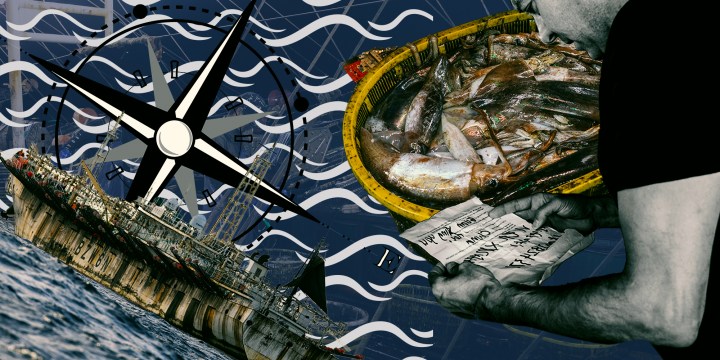
In recent decades, working aggressively to expand its might, China has transformed itself into the world’s seafood superpower. This pre-eminence has come at a grave human and environmental cost. Part Five: Willing to confront ocean issues, China ignores its fishing labour problems
Aboard the Ocean Warrior on the South Atlantic – On the high seas roughly 1,000 miles north of the Falkland Islands, an 18-year-old deckhand working on a Chinese squid ship nervously ducked into a dark hallway to whisper his plea for help. “Our passports were taken,” he said to the visiting reporter. “They won’t give them back.”
Instead of speaking more, he then began typing on his cellphone, for fear of being overheard. “Can you take us to the embassy in Argentina?”
Few workplaces are as gritty and brutal as distant-water fishing ships from China, and there are a lot of them: China today operates the world’s largest distant-water fishing fleet, which is more than double the size of its next competitor. It’s rarely easy for crew members to leave these ships, and often it’s forbidden. Workers on China’s vast armada of squid ships, which make up the majority of the vessels in the fleet, for example, typically spend two years almost entirely at sea, most of the time with no internet or phone signal, isolated from their friends and family. Workdays routinely last 15 hours, six days a week. Crew quarters are cramped, with 10 men bunking in rooms built for half that number. Injuries, malnutrition, illness and beatings are common.
China has been ranked as the world’s worst purveyor of illegal fishing, and its practices have received so much attention recently that the country has taken steps in the past several years to bring them under control. But the human rights abuses taking place on its ships – far out at sea, away from public view – have attracted less notice and so remain rampant.
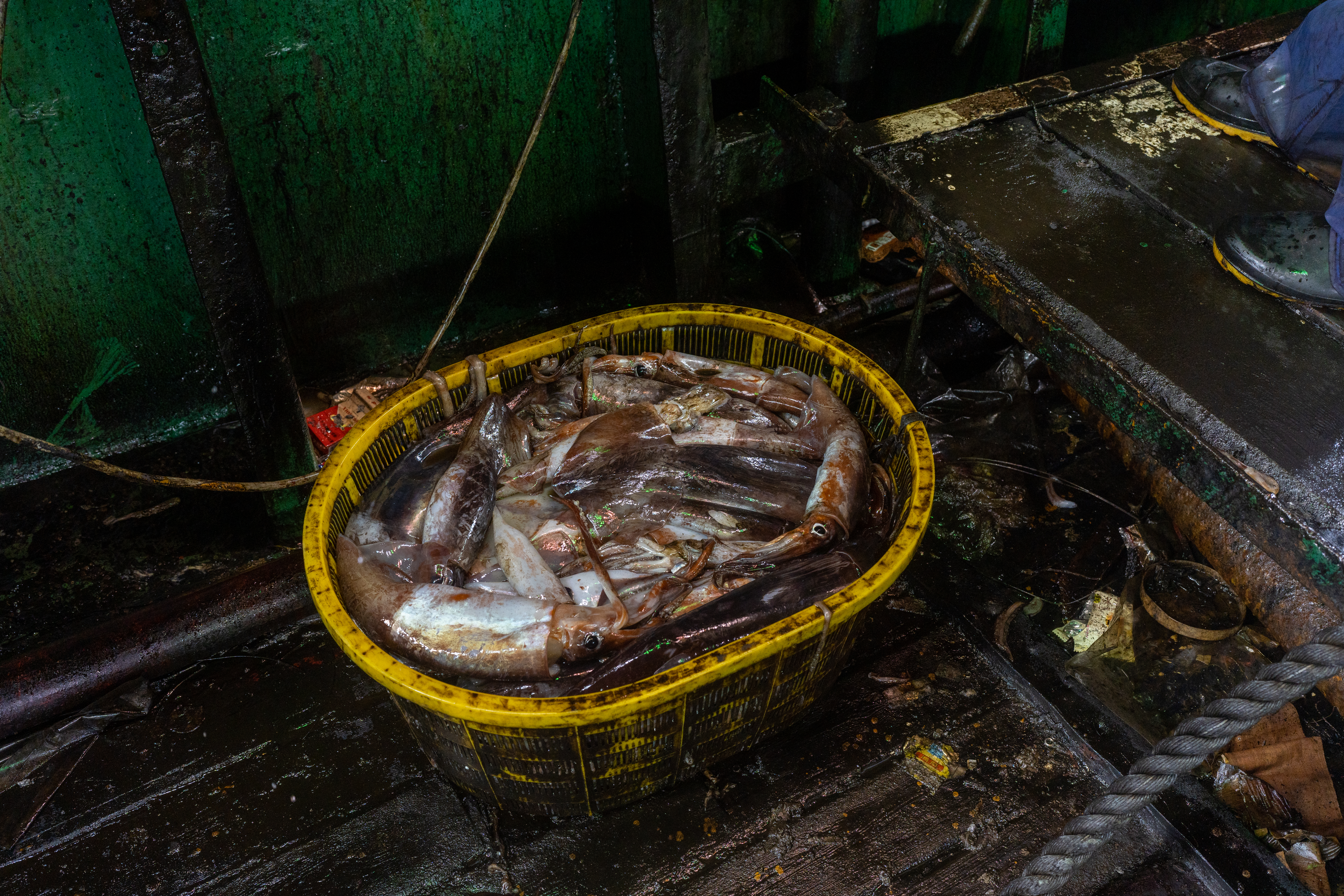
When caught, squid squirt a warm and viscous, purplish black ink which creates a slippery mucus-like ooze. 7 July 2022 (Photo: The Outlaw Ocean Project/Ed Ou)
Yin Chi, a former Intermediate Court judge from China now based at the NYU School of Law, said the Chinese government’s top priorities in recent years have been economic growth and social stability, not labour conditions aboard its fishing fleet. “A seafarer’s labour dispute won’t be easily noticed by the public,” she said, “unless there is a protest or some sort of high-profile case.” Confronting these labour rights publicly, she added, could trigger social unrest.
Chinese officers regularly beat Indonesian deckhands for mistakes, sleights or slowness, and sometimes those beatings become fatal.
Occasionally, crew members have escaped and reported on conditions themselves. In 2014, for instance, 28 Africans fled a Chinese squidder called the Jia De 1 while it was anchored in Montevideo. Some of them later described to local reporters how they had been beaten on the ship. One, who described having been shackled when not working, showed reporters what he said were shackle marks around his ankles.
“The cases I see don’t tend to look like accidents,” said Jesica Reyes, an interpreter in Montevideo. “They look like abuse.” For the past decade, Reyes has fielded hundreds of emergency phone calls from fishing-company agents, police, deckhands and the Indonesian consulate, urgently asking her to get to the port to talk to families of deckhands, to handle lawyers for repatriation or wage disputes, and to interact with police or doctors when ships drop off Indonesian crew who are sick, injured, disgruntled or dead.
Chinese officers regularly beat Indonesian deckhands for mistakes, sleights or slowness, Reyes said, and sometimes those beatings become fatal. She recounted her most recent case, which concerned an Indonesian named Daniel Aritonang who was dropped off in port in March 2021, having been transferred from a Chinese squid ship called the Zhen Fa 7. Barely conscious, covered in bruises, his feet swollen from malnutrition, Aritonang had ligature marks from a rope he said had been tied around his neck. He died at the hospital several hours later.
A broad pattern of labour abuse on Chinese squid ships has been well documented. The US department of labour has also examined the problem, and in 2020 concluded that many deckhands on Chinese squid ships worked involuntarily under conditions of coercion, fraud, intimidation or debt bondage. In 2021, the Environmental Justice Foundation, an advocacy group based in London, released a report based on having interviewed 116 Indonesian crew members from Chinese ships. It revealed that roughly 97% of them reported experiencing some form of debt bondage or confiscation of documents. The report also showed that 85% had reported abusive working and living conditions, 70% had experienced intimidation and threats, and 58% had seen or experienced physical violence.
“The conditions inside the boats are not the best, and the work is tough,” said Nicolas Potrie, who runs the Indonesian consulate office in Montevideo, adding that injured or sick workers who are dropped off in port are often reluctant to explain what happened to them, fearing retribution. Not surprisingly, given these conditions, China has struggled in recent years with strikes, mutinies and violence on its squid ships, which feed the world’s growing demand for calamari.
To get paid fully, the crew on Chinese fishing ships usually have to complete the entire term of their contract, which often includes heavy financial penalties if a deckhand attempts to leave prematurely. This type of provision in a job contract violates anti-trafficking laws in the US and Indonesia if it also involves fraud or coercion, according to Martina Vandenberg and Margaretha Quina, lawyers in Washington, D.C. and Jakarta.
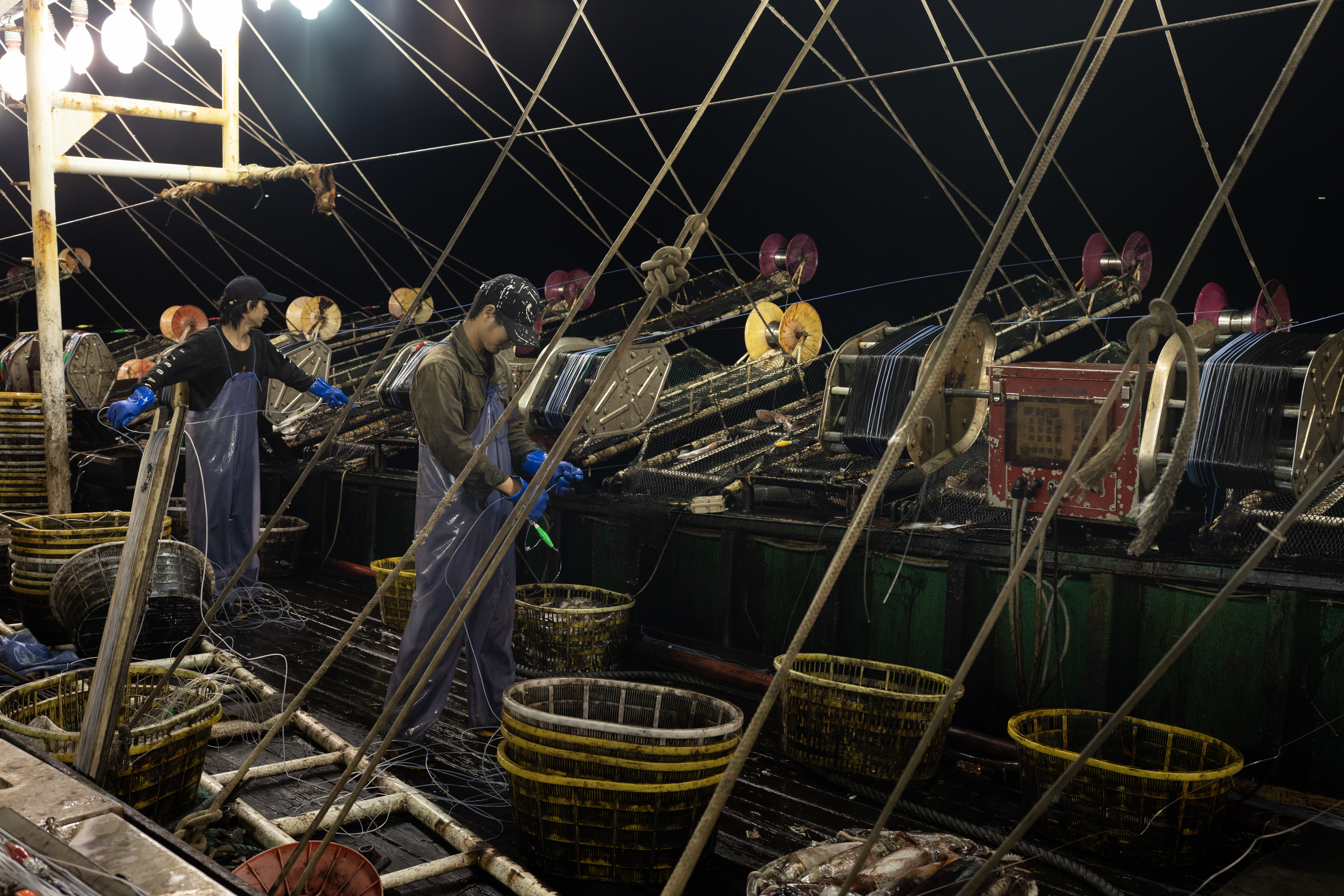
Crew on board a Chinese squid vessel use jigs and bright lights to catch squid at night. 7 July 2022 (Photo: The Outlaw Ocean Project/Ed Ou)
When Chinese fishing ships visit their waters, some countries have been reluctant to provide asylum or safe passage for injured, sick or disgruntled crew seeking to disembark. In October, 2015, for example, the Chinese crew on a squid jigger called the Ningtai 89 went on strike after the ship owner tried to pay lower wages than he had originally promised. The crew insisted that they wanted to disembark and be flown home, but the company baulked.
The strike soon escalated into mutiny, with the crew forcing the ship into the Peruvian port of Callao, where the Peruvian Navy pushed the vessel back out to sea. The crew forced the ship back into the port, this time running it aground. Local police considered the event an illegal entry, and Peru’s ministry of foreign affairs, citing violations of the country’s immigration procedures, lodged a complaint to the Chinese consulate. Five days later, the crew were allowed entry into Peru and flown to China, where the leader of the strike was prosecuted and convicted of hijacking.
***
To chronicle conditions on Chinese distant-water squid ships, a team of reporters boarded vessels at sea to talk to crew, or pulled alongside to interview Chinese officers by radio. In many instances, the Chinese ships got spooked, pulling up their gear and fleeing the scene, and the reporters trailed the ships in a smaller and faster skiff to get close enough to throw onto their aft decks a plastic bottle weighed down with rice. The bottle contained a pen, cigarettes, hard candy and interview questions written in English, Chinese and Indonesian.
As he entered, a rat scurried out from under the tarp covering his area. ‘They treat us like dogs,’ Jarju said.
Violence and homesickness, long hours and filthy conditions make life on Chinese fishing ships a tough experience. On the Lu Lao Yuan Yu 010, a Chinese trawler fishing on the North Atlantic Ocean off the coast of Gambia, a Senegalese deckhand named Lamin Jarju showed a visiting reporter his living quarters: A nest of crumpled newspapers, clothing and blankets two levels to the roof of the wheel room, where the captain works. As he entered, a rat scurried out from under the tarp covering his area. Several crew members, he explained, had been sleeping in these quarters ever since the captain hired more workers than the ship could accommodate. “They treat us like dogs,” Jarju said.
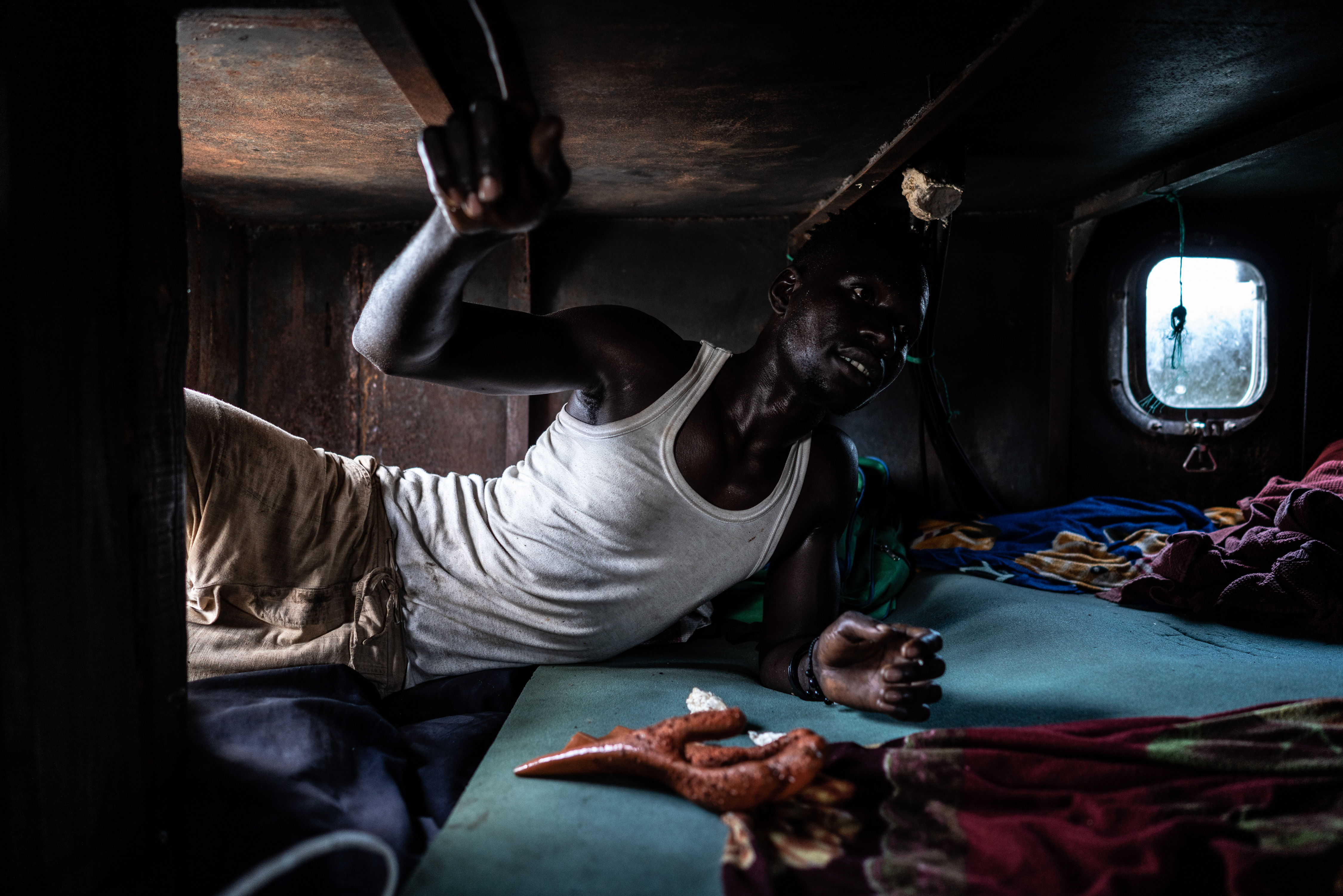
On the Victory 205 in Gambia, six African crew members from Sierra Leone and Gambia slept in a small crawlspace between the engine room and wheelhouse. 2 September 2019 (Photo: The Outlaw Ocean Project / Fábio Nascimento)
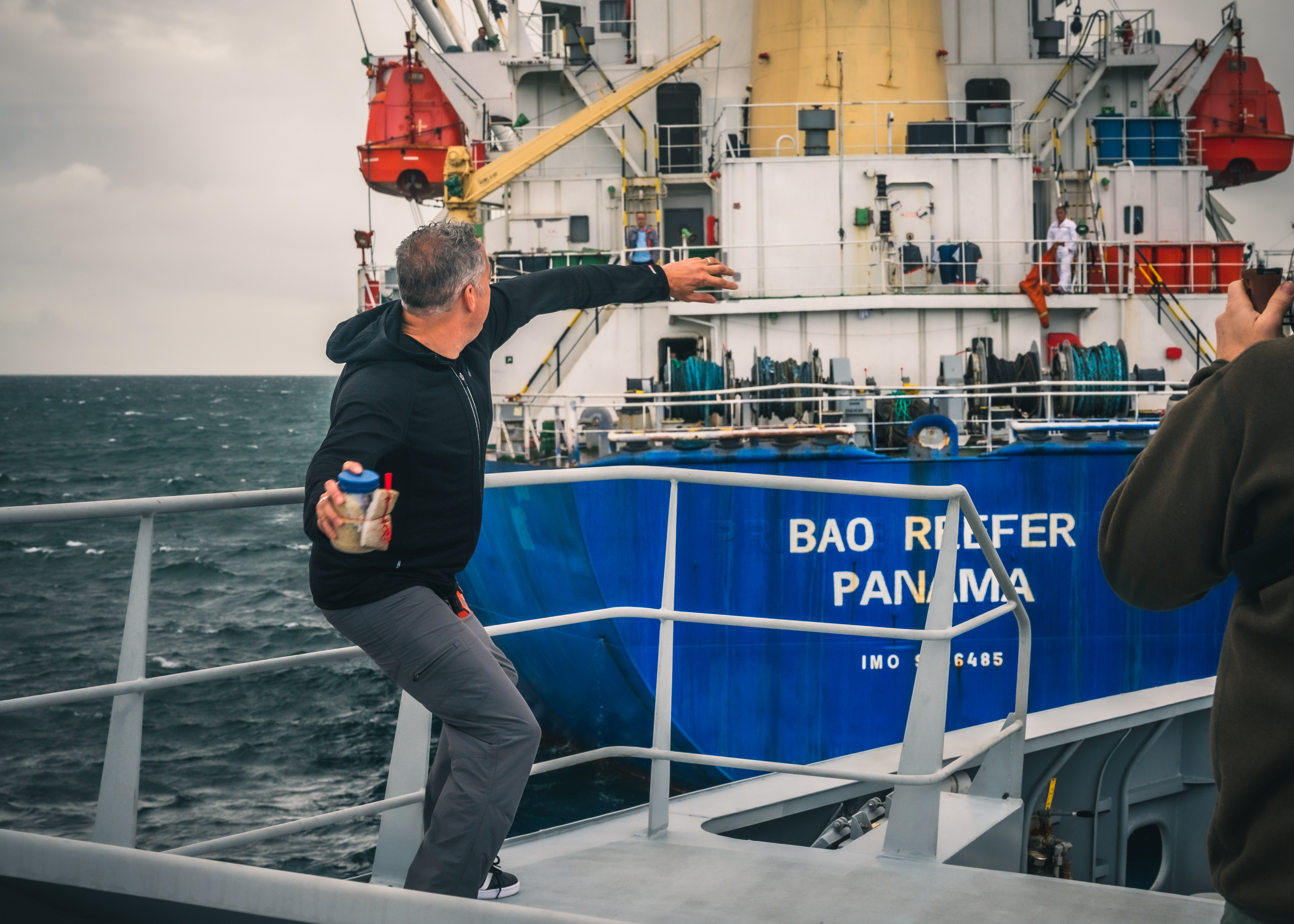
To communicate with crew, reporters prepared plastic bottles weighed down with rice, and that contained a pen, cigarettes, hard candy and interview questions written in English, Chinese and Indonesian, to toss onto their aft decks. February 2022 (Photo: Youenn Kerdavid / Sea Shepherd Global)
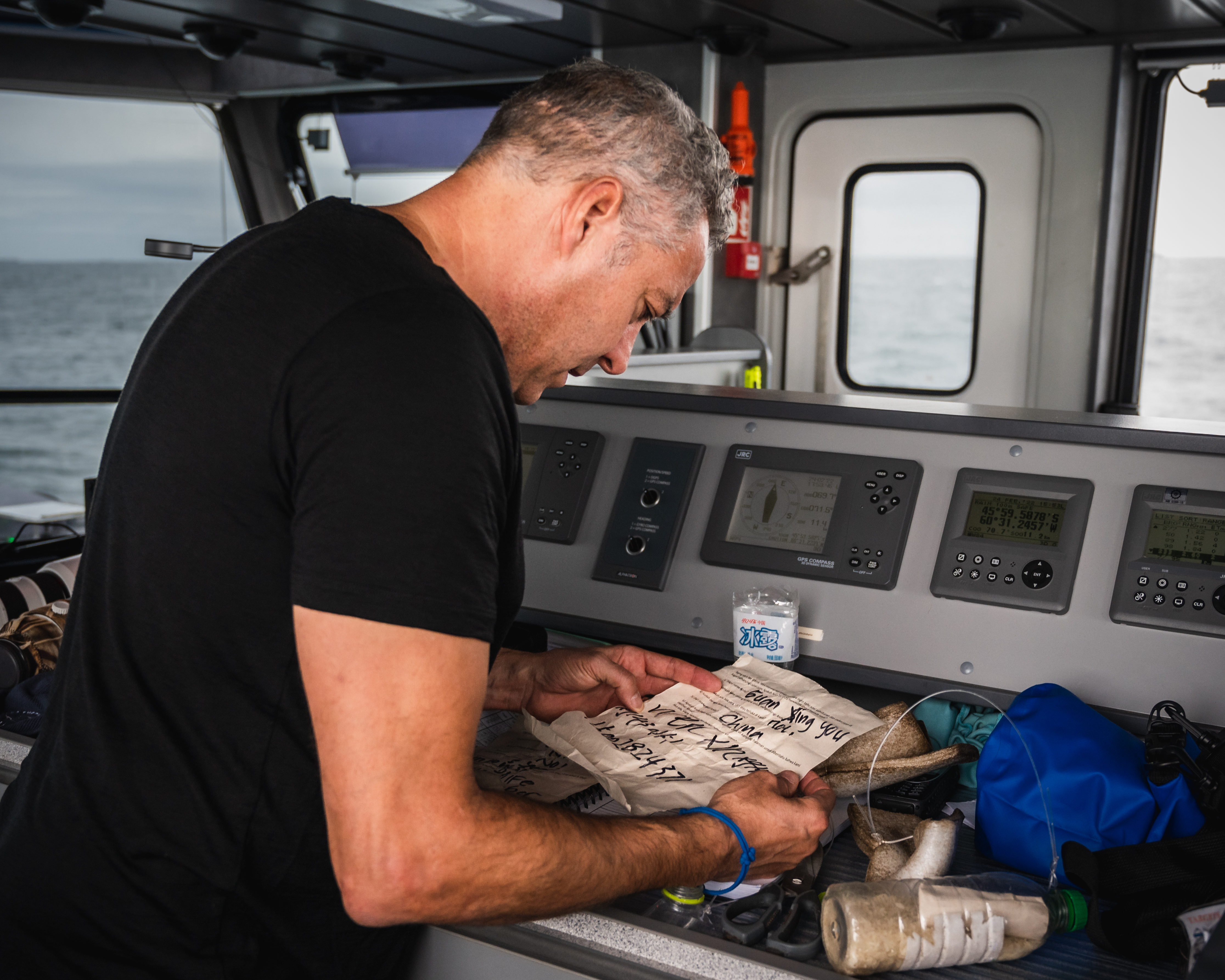
Reporter Ian Urbina reviews the message thrown back to him in a bottle from crew on a Chinese squid ship. February 2022 (Photo: Youenn Kerdavid/Sea Shepherd Global)
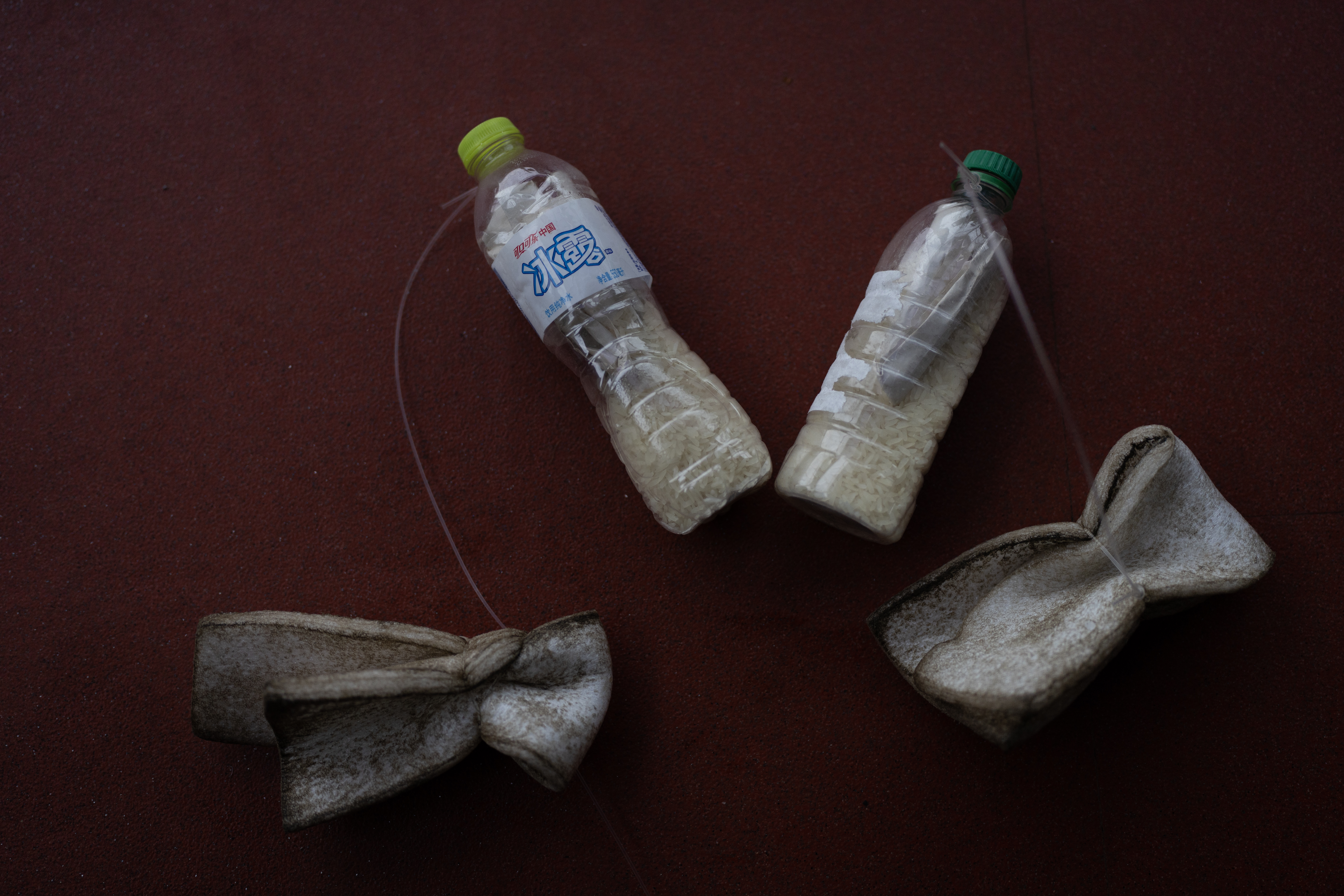
The reporting team tossed bottles onto the Lu Rong Yuan Yu 668, Lu Qing Yuan Yu 279, Guo Ji 902, and Fu Yan Yu 715. 24 February 2022 (Photo: The Outlaw Ocean Project / Ed Ou)
On a different Chinese trawler in the area, the Victory 205, other African deckhands showed where eight men slept in a space meant for two: A 1.2m-tall, steel-sided compartment directly above the engine room, which made it dangerously hot. When high waves crashed onboard, water flooded the makeshift cabin, where, the workers said, an electrical power strip had twice sparked, nearly setting their mattress on fire.
‘Brutal’ beating
In Punta Arenas, Chile, aboard a fishing expedition headed to the waters near Antarctica in January 2019 to catch Patagonian toothfish, also known as Chilean Sea Bass, I noticed a dozen rusty Chinese squid ships a mile from port. I asked our crew of mostly Chileans about these ships and they pointed to one of the anchored ships and recounted watching the Chinese captain several weeks earlier punch and slap deckhands who, they said, looked Filipino or Indonesian. The Chileans said they pulled a dozen yards alongside the Chinese ship and began screaming at the captain to stop and he eventually did. “It was brutal, like 15 minutes straight of beating,” the Chilean told me.
Roughly 350 miles west of the Galapagos Islands, in the Pacific Ocean, the team of reporters got a close-up look at the conditions aboard a Chinese squid ship.
On deck, both sides of the vessel were festooned with 300 or more bowling-ball-sized light bulbs, which hung on racks for the purpose of enticing squid up from the depths. At night, when the bulbs were turned on, the effect was blinding and made the surrounding blackness feel stark, timeless, otherworldly. The glow of a squid boat with its lights on is visible at sea to the naked eye more than a hundred miles away.
The crew tie their dirty clothes together to form a long rope… that they drag for hours in the sea behind the ship.
Scores of fishing lines extended out into the water under the lights, each bearing a specialised squid hook, known as a “jig”. When a squid latched onto a line, the reel automatically flipped it onto a metal rack. The deckhands then tossed it into plastic baskets for later sorting. Often these baskets overflowed, and the deck floor filled shin-deep with squid, leaving virtually no place left to walk. The squid became translucent in their final moments, draining of the pale-red tint in their skin, sometimes also making a final hissing or coughing sound. The stink and stain of squid are virtually impossible to wash from clothes. Bigger ships have washing machines, but on smaller ones, the crew tie their dirty clothes together to form a long rope, occasionally stretching 6m, that they drag for hours in the sea behind the ship.
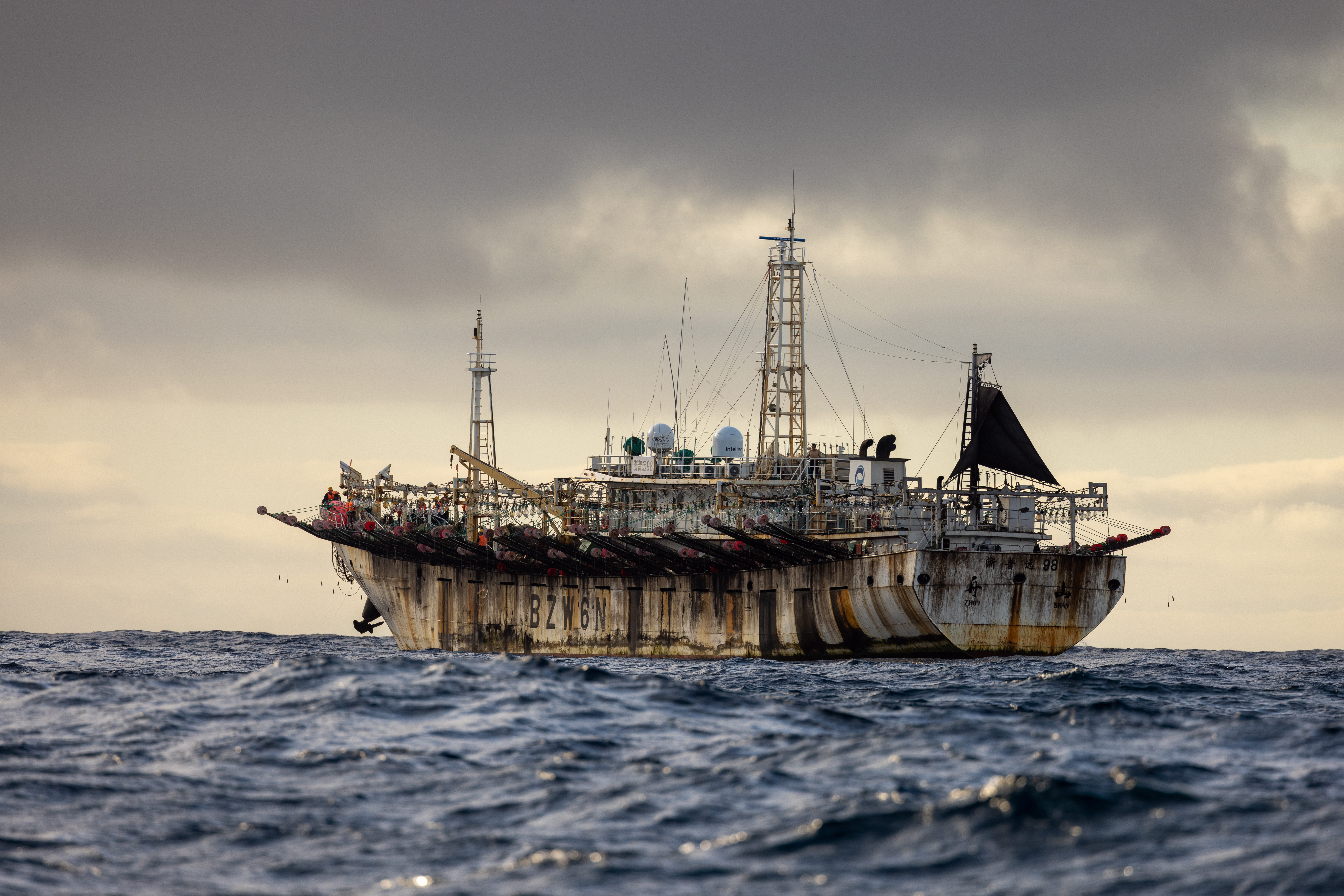
The Zhe Pu Yuan 98 is a fishing ship that was renovated into a medical ship to treat crew who suffer injuries or illness while working on the high seas. 9 July 2022 (Photo: The Outlaw Ocean Project / Ben Blankenship)
When the crew were not fishing, they weighed, measured, washed, sorted, eviscerated or packed the squid into metal trays for freezing and bagging. They prepared bait by carving up caught squid, separating the tongues from inside the beaks and cutting out the soft tissue around the beaks. Below deck, they had daily duties: Sweeping hallways, scrubbing toilets, mopping showers. The ship had been at sea for four months and had long since run out of vegetables and fruit. Several days after their first visit, the reporters encountered the ship again, this time at night, elsewhere in the fishing grounds. Since the crew seemed to lack fresh fruit or vegetables, the reporters put a watermelon in a sack to offer as a gift, tying the sack to a rope and tossing it up to the crew.
***
Since the pandemic, the Chinese distant-water fishing fleet has shifted away from recruiting foreign deckhands, relying instead mostly on Chinese workers, many of them recruited from rural and inland regions of the country. More than 292 million people migrated in 2021 within China, a level accelerated by climate change, which has produced faster temperature increases and sea level rises in the country than the global average. Online and in cities within China, the labour problems, especially on squid-fishing ships, are an open secret.
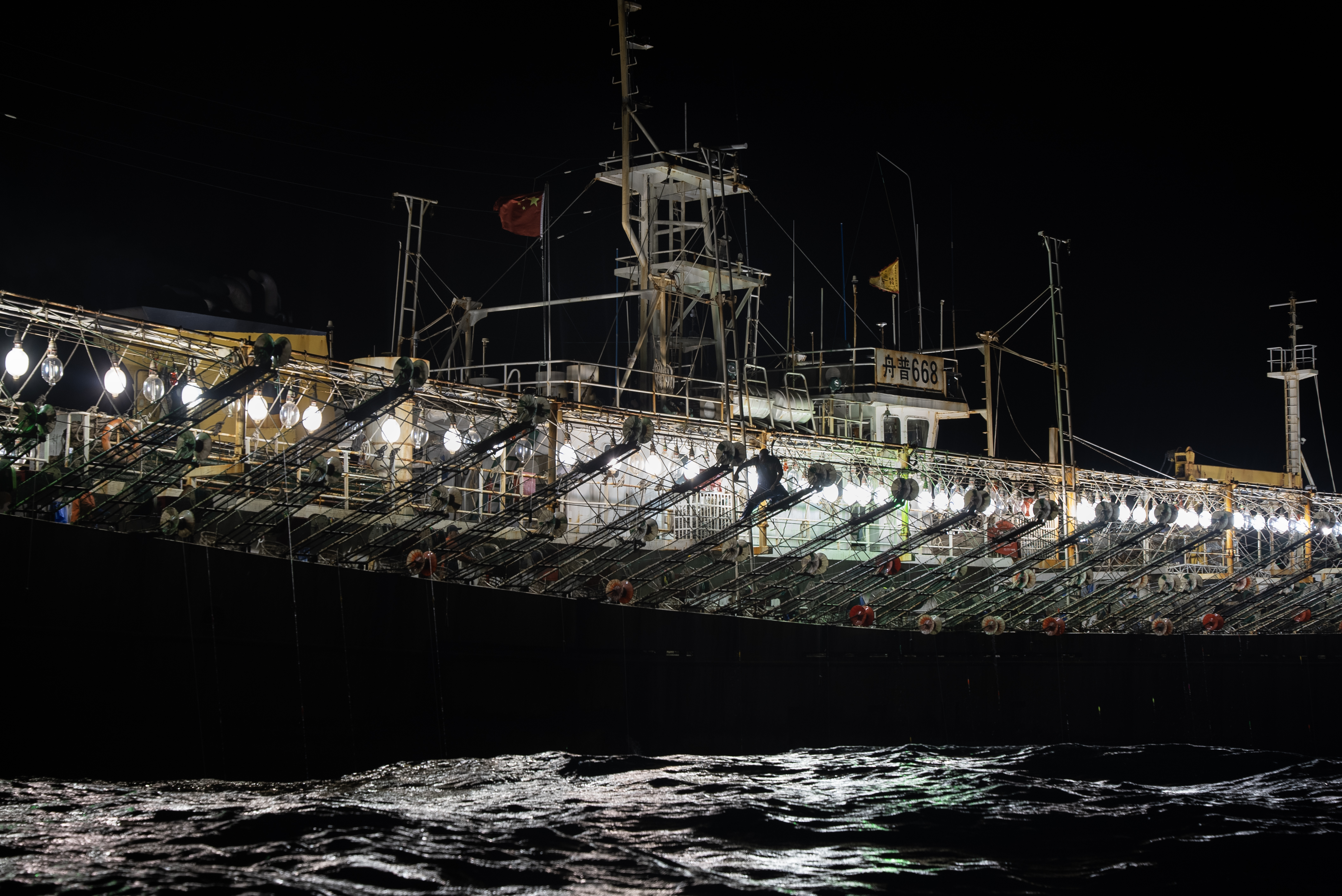
Hundreds of light bulbs adorn the sides of ships to attract squid to the surface of the water, where they can more easily be caught. 9 July 2022 (Photo: The Outlaw Ocean Project / Photographer: Ed Ou)
‘Fool’s game’
On Zhihu, an anonymous Chinese question-and-answer website like Quora, former crew members from these ships routinely caution about conditions on the vessels. Posts on the website describe debt-bondage schemes wherein labour recruiters target farmers and factory workers. In a cautionary video posted in 2020, a narrator recounted what he described as a friend’s experiences working on a distant-water squid-fishing ship.
“Always be wary of these offshore fishing companies’ schemes,” the narrator said. Regular work days last 13 to 14 hours, he said, but when the squid are abundant, deckhands have to stay awake for three days and nights straight. “All the locals agreed that squid fishing was a fool’s game,” a Chinese reporter wrote in 2016 in an Esquire China story about the port of Shidao, which is located in Shandong province. “And there wasn’t enough money in it, so you could only get crew from inland China.” Labour recruiters sometimes target the desperate. “If you are in debt, your family has shunned you, you don’t want to be looked down on, turn off your phone and stay far away from dry land,” reads an online advertisement.
Deckhands are often lured to port cities with promises of lucrative contracts, only to discover that to get a job they have to pay a series of fees, typically up front or with a loan from manning agents, who recruit workers for jobs at sea, according to a news story published online by Shandong Television in April 2015. The equivalent of several months’ wages, these fees cover such expenses as travel to the ship, job training, insurance, bedding, crew certifications, medical check-ups, food and protective workwear.

Rafly Maulana Sadad broke his back after falling down a flight of stairs in March 2021 on a Chinese squid ship. The captain refused to return to port to get medical care for another five months. August 2021 (Photo: Supplied/Rafly Maulana Sadad)
Between 2016 and 2020, Chinese crewing and fishing companies often entrapped their workers using confusing or misleading contracts, according to a study from the Ningbo Maritime Court, in Zhejiang province. Most of the disputes reviewed – 180 out of 267 – concerned labour contracts, typically involving crews who had left their ships before their contracts had expired, often because the captain had allegedly reneged on promised pay. Vaguely written or verbal contracts make it virtually impossible for workers to determine legal liability or to collect unpaid wages and injury compensation, the court study said.
Over the next five weeks, the ship split into warring factions in which men disappeared at night, crew members were tied up and tossed overboard to drown, and engine equipment was sabotaged.
Yin Chi, the former Intermediate Court Judge from China, added that workers are usually obligated to mediate or arbitrate wage disputes or injury claims before they can litigate, making it even more challenging to beat the statute of limitations. In 2020, China’s Supreme Court also weighed in on the situation, declaring that better protection was needed for “wages, remuneration and other relevant expenses [that] relate to the basic survival, physical and mental health, and personal dignity of seafarers”.

Jesica Reyes, the only Spanish-Bahasa translator in Montevideo, learnt Bahasa by speaking to deckhands who gathered at an internet cafe. 1 April 2013 (Photo: Jesica Reyes/Facebook)
One famously gruesome mutiny, which took place aboard the Lu Rong Yu 2682 in 2011, fixated China. The lead mutineer was a deckhand named Liu Guiduo. Before disembarking from Shidao port, Liu, a three-pack-a-day smoker, had bought 165 cartons of cigarettes from the captain on credit, stacking them next to his bunk, floor to ceiling. After leaving shore, the ship’s captain informed the crew that they would not be paid a fixed salary, as they had been promised, but instead would receive payment baked on a percentage of their catch. After realising that his earnings would likely not even cover what he owed for the cigarettes, Liu recruited nine other crew to take the captain hostage.
Over the next five weeks, the ship split into warring factions in which men disappeared at night, crew members were tied up and tossed overboard to drown, and engine equipment was sabotaged. Stranded at sea, the crew eventually managed to restore the ship’s communications system and transmit a distress signal, drawing two Chinese fishing vessels to their aid. Eleven of the original 33 men made it back to shore. In 2013, five of the accused, including Liu and the ship’s captain, were sentenced to death, one crew member was given a suspended death sentence, and the other five received terms of between four years and life in prison.
***
China has taken some limited steps recently to prevent strikes, mutinies and violence on its fishing ships. Local police in some coastal cities have begun using satellites to communicate directly with some distant-water fishing vessels, even monitoring real-time surveillance footage from onboard.
In March 2020, a dozen Chinese workers on a Chinese squid ship anchored near the coast of Peru went on strike, frustrated at not being able to return home because of China’s pandemic controls. The Chinese fishing company contacted the police in Zhejiang province, who spoke directly to the crew by satellite phone. After listening to their grievances, the police officer arranged for a psychologist to hold therapy sessions with the crew members remotely to help alleviate their stress. The police officer also explained to the workers that their options were to transfer and sail home on a supply ship, which would take about a month, or to return to shore in Peru immediately and fly back to China, but at their own expense. The men opted to return to work and stick it out.
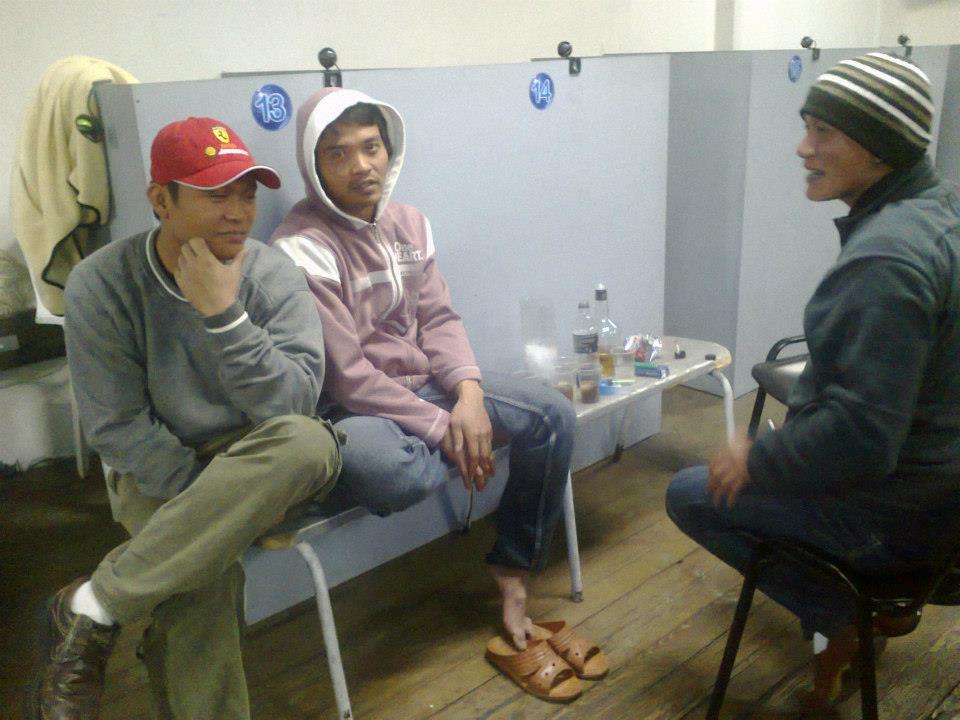
Indonesian customers chat and drink outside a phone booth at New Jakarta Cafe in Montevideo, Uruguay. 4 May 2013 (Photo: Jesica Reyes/ Facebook)
Some provinces in China fund medical ships to shadow distant-water fishing fleets based in their ports. “If a patient is too sick for us to handle, we drop him in Peru,” an officer on the bridge of the Zhe Pu Yuan 98, a squid ship that doubles as a floating hospital, said over the radio when a reporter pulled alongside it, roughly 400 miles from the Galapagos in the Pacific Ocean. In 2021, the Zhe Pu Yuan 98 replaced the Pu Yuan 801, which over the previous five years had treated nearly 300 crew members, escorted more than 20 critically ill crew members to the port of Peru, and completed the rescue of five fishing boats that had lost power. The Chinese government has also tried to address mental health concerns that contribute to violence on their ships. In 2017, after a Filipino crew member reportedly jumped overboard to his death, the Chinese government created a Communist Party branch in Chimbote, Peru – the first for fishing workers – intended to bolster their “spiritual sustenance”.
***
On the Chinese squid ship north of the Falklands where the 18-year-old begged to be taken to the Argentinian embassy, another deckhand, who was 28 years old, explained that it was his first time at sea. He earned $883 per month, adding that if he and his fellow deckhands missed a day of work for sickness or injury, they were docked three days’ pay. “It’s impossible to be happy,” he said. “We care about nothing because we don’t want to be here but we are forced to stay.” He estimated that 80% of the other men would leave if they were allowed. “It’s like being isolated from the world and far from modern life.”
A minder who kept watch on the men was temporarily called away, which allowed the deckhands to continue their exchange with the visiting reporter. “I can’t disclose too much right now given I still need to work on the vessel, if I give too much information it might potentially create issues onboard,” the 18-year-old wrote on his cellphone. “Please contact my family,” he said, before abruptly ending the conversation when the minder returned.
Port records in Montevideo offered little additional information about the 18-year-old’s ship, except to indicate that it had dropped off a dead worker in April 2019. Contacted at her home in Fujian province, the older sister of the 18-year-old deckhand was told of her brother’s plea for help. “My heart really aches,” she said. She explained that being from inland, she and her family knew little about the fishing industry, though they had been sceptical and had disagreed with her brother’s decision to work at sea. They had encouraged him to consider other options, including being a police officer, but he was persistent.
“He’s really too young,” she said. “And now there is nothing we can do, because he’s so far away.” DM
Read The Outlaw Ocean Project Part One, Part Two, Part Three and Part Four
This story was produced by The Outlaw Ocean Project, a nonprofit journalism organisation in Washington, D.C. Reporting and writing was contributed by Ian Urbina, Joe Galvin, Maya Martin, Susan Ryan, Daniel Murphy and Austin Brush. This reporting was partially supported by the Pulitzer Center.





















 Become an Insider
Become an Insider
Hang on. What are you saying? This is China, our buddy, the country that represents the big C in BRICS.
This can’t be true, because we all know they’re lovely, just like our other buddies the Russians and Hamas (yes and you too Julius – yes, we know you invented China, yes)
I smell a US Western caitalist plot here …wait, no I think it may be the squid.